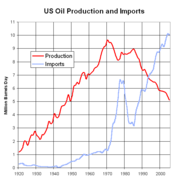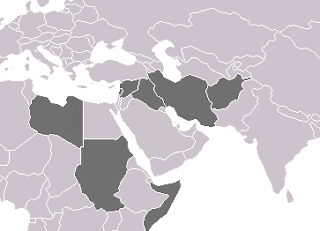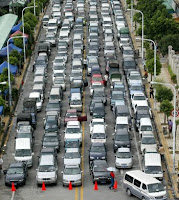 Peak oil in the United States happened before 1970, and it has been a long ride downhill. The United States' domination of the world in the 20th century was based on oil, and when it started depending on oil imports, things started to go wrong.
Peak oil in the United States happened before 1970, and it has been a long ride downhill. The United States' domination of the world in the 20th century was based on oil, and when it started depending on oil imports, things started to go wrong. The 1973 Arab oil embargo underlined this problem. Our prescient president Jimmy Carter put on a sweater and set sheep to graze on the White House lawn, but he was ineffective in his quest to convince the American people that energy independence was critical: they were in denial as global oil production per capita reached its peak in 1979, and they elected Ronald Reagan.
The 1973 Arab oil embargo underlined this problem. Our prescient president Jimmy Carter put on a sweater and set sheep to graze on the White House lawn, but he was ineffective in his quest to convince the American people that energy independence was critical: they were in denial as global oil production per capita reached its peak in 1979, and they elected Ronald Reagan. Reagan made people feel better, and they soon forgot about the whole energy mess – for a generation. Cars got huge, and then even huger, and oil remained relatively cheap. But the demographic shift worldwide set up massive structural problems that couldn't be ignored, at least not by the ruling class. They understood that trouble was coming quickly, and groups such as the Project for the New American Century set up plans to counter these shifts.
Reagan made people feel better, and they soon forgot about the whole energy mess – for a generation. Cars got huge, and then even huger, and oil remained relatively cheap. But the demographic shift worldwide set up massive structural problems that couldn't be ignored, at least not by the ruling class. They understood that trouble was coming quickly, and groups such as the Project for the New American Century set up plans to counter these shifts. After the media and the Supremes pushed their man into power in 2001, the neocons were in their springtime. Dick Cheney's energy task force made tactical plans, as the Bush administration had already decided to invade Iraq.
After the media and the Supremes pushed their man into power in 2001, the neocons were in their springtime. Dick Cheney's energy task force made tactical plans, as the Bush administration had already decided to invade Iraq.I'm not going to get into the entire September 11th thing. If you choose to open that door and reconsider what you saw that day and try to match it up with what you've been told since, I guarantee you won't like it. Whatever its cause, that convenient crisis was used as the launching point for a campaign fulfill a clear agenda: the United States sought to seize control of middle eastern oil.
 Afghanistan was just the preamble. The Plan, as outlined by Gen. Wesley Clark (ret.): seven more countries in five years: Iraq, Syria, Lebanon, Libya, Somalia, Sudan, Iran. You will note that those countries bracket the largest proven oil reserves in the world. The notable oil producing country that isn't mentioned in the list (Saudi Arabia, a nominal US ally whose shaky kleptocracy has close ties to the US élite) would end up pretty much surrounded. If your goal is to establish military domination over a region, this looks like a very good plan.
Afghanistan was just the preamble. The Plan, as outlined by Gen. Wesley Clark (ret.): seven more countries in five years: Iraq, Syria, Lebanon, Libya, Somalia, Sudan, Iran. You will note that those countries bracket the largest proven oil reserves in the world. The notable oil producing country that isn't mentioned in the list (Saudi Arabia, a nominal US ally whose shaky kleptocracy has close ties to the US élite) would end up pretty much surrounded. If your goal is to establish military domination over a region, this looks like a very good plan.The invasion and occupation of Afghanistan has had many conflicting justifications and pretexts, among them Osama Bin Laden (who is in Pakistan, and who isn't important anymore); the status of women (which was only a priority for a hot second) and finally, the scary Taliban (unless and until the US can make a deal with them – then all is forgiven. Again.) But really, Afghanistan is now simply a convenient location for military bases (strategically placed around a certain strategic asset) next to two problematic countries.
Discussing the justifications floated for the invasion of Iraq would take more time than I want to devote to it, but between the weapons of mass destruction, Al-Qaeda links, spreading freedom, massacres, rape rooms, spreading democracy, and other altruistic and high-sounding bullshit, none of them tend to last more than six months. The longest lasting reason so far has been obstinate tenacity. That is unrealistic as a basis for foreign policy. At the very least Iraq continues to present plenty of convenient opportunities to rattle the sabre at Iran.
This is really, really bad news for the United States. The Terror War for Oil was conceived as the last chance to sustain American hegemony, supplying the energy to hold the country over until new technologies become available (or at least until the Baby Boomers die). But it failed, and now the US is broke, mired in an anthill, and beset by competition from countries with younger, larger, and better educated populations, with larger supplies of oil, more effective governments, and more dynamic economies.
 Which is not to say that the United States is a bad place, or that it will be worse than other places. On the contrary, it will probably do reasonably well once it extricates itself from some current difficulties. But it will never rule the roost again, and Americans are going to have to learn to shed the myth of American exceptionalism. The tank is empty, and the US will have to learn to wait in line at the gas station just like everybody else.
Which is not to say that the United States is a bad place, or that it will be worse than other places. On the contrary, it will probably do reasonably well once it extricates itself from some current difficulties. But it will never rule the roost again, and Americans are going to have to learn to shed the myth of American exceptionalism. The tank is empty, and the US will have to learn to wait in line at the gas station just like everybody else.
2 comments:
amen.
So true. It is interesting to see the news while in the States. People around the world is tired of American politicians acting as 'police of the world' It is hard to trust the US government now, and that is sad. But, everyone there seems to love Bush as we speak...
If the US (government I mean) was really concerned about people's freedom, sovereignty and all the good stuff they preach to care for in other countries, they would have invaded Iran, North Korea among others- They appear to be building weapons of mass destruction. As you said, the move to invade other countries seems (cynically) to be for economic reasons. 9-1lth? Yeah, that is in question.
I am not really sure where capitalism and the States are heading. They is a much needed change. For instance health care is just insane in the States. It is not fair to most. Changing the mentally for good simple things such as planning and/or building bike paths and city planning in general are just not happening. A simple thing like that can help to improve not only people's health, but also it can have a bit of an impact in the invironment. Why not leading the world with things like that? There you have the isolated suburbs (some with not even walk paths!)
I just read the news about Bush failing to get more oil from the Saudis. He wants to move into drilling more- killing the environment in Alaska- and building nuclear plants. Gosh, I am glad his time is up. What about investing on other source of energy such as solar and wind farms? Maybe leading the world that way? They can sell the technology :) I guess it is not as lucrative as their proliferation of weapons to sell.
The current government is doing their best to lose the touch with their own people- not to mention abroad.
I just read an article recently saying that McCain 'envisioned' winning the war of Iraq by 2013 and capturing Osama (oh, oh... people do not forget about Osama, time the get scared- here comes the 'vote pour moi' tactic once again) He is out of his mind.
At this point, it all a mess.
A major clean up is needed and it CAN be done. My wish and hope is that the US government will do their best to reach *somehow* harmony at least among its citizens. With Bush,McCain, Chaney-like minded individuals I envision an even more lost of reputation worldwide therefore more isolated, and even the separation of some States- civil movements, revolutions? you bet. It sounds pessimistic, but as you mentioned, Carter tried to have an impact for the long run, but Reagan came to bring a short lived happiness; less taxes, cheap oil, etc.
How about building bridges instead of building walls on your borders? Every time I hear about spending millions of dollars for the construction of the walls on the border with Mexico (and planning soon for Canada) It comes to mind the wall of Berlin- Bad leaders construct them; and the good ones destroy them looking to unify people and places. That makes sense to me anyway.
Americans are smarter than that. There ARE good leaders out there. I am starting to like the approach to issues of Obama.
Great post!
Post a Comment